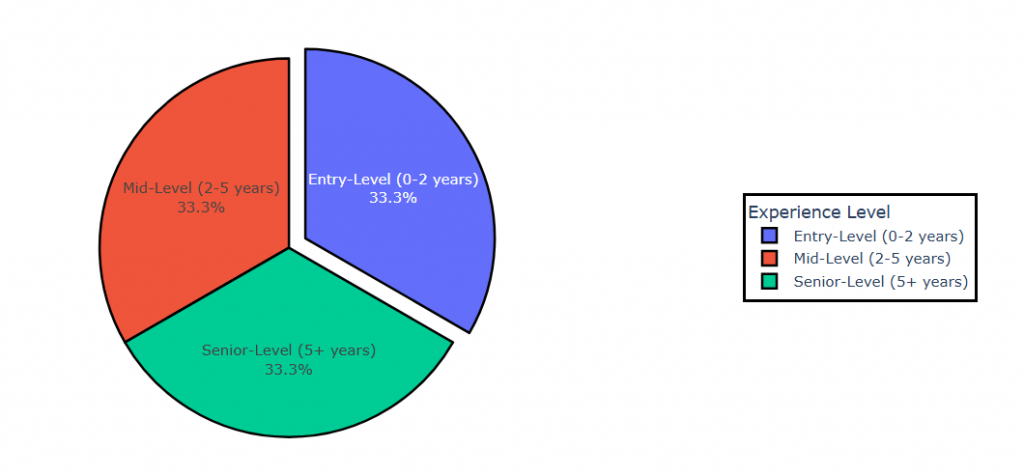In 2025, the demand for data scientists continues to grow, as organizations across the globe heavily rely on data to make smarter decisions that help them to grow their businesses. If you are thinking about how to become a data scientist , you’re on the right track and you are choosing one of the most dynamic and rewarding careers for your self growth.
Data Science is a multidisciplinary field that combines multiple domains including programming, computer science fundamentals, mathematics, business knowledge etc. This blog will help you through the essential steps to start your journey, from acquiring the educational qualifications, mastering tools and techniques that are actually required in the path of becoming data scientist in 2025.
With the rapid advancement of technologies like artificial intelligence and machine learning, the role of a data scientist has become more critical than ever before. In this blog, we’ll break down the key skills, tools, and experiences needed to thrive in the field, helping you understand the exact steps to take to become a successful data scientist in 2025.
What is Data Science ?
Data Science is a wide field that uses scientific methods, algorithms and business knowledge to extract valuable insights from the structured and unstructured data. It combines multiple domains including statistics, computer science and domain expertise to analyze and manage large and complex datasets. Data Science involves various steps including data collection through various sources, data cleaning, data exploration , statistical analysis and data visualization.
Data Scientists build models using various techniques like machine learning, deep learning and artificial intelligence. These models are used to predict trends, uncover patterns, and solve complex problems in various industries including healthcare, finance, retail , marketing and IT. Data Scientist needs to cover tools and technologies such as SQL, Hadoop and Spark to work with large and complex datasets.
In addition to technical skills, data science also requires a strong understanding of the business context and the ability to communicate findings effectively to non-technical stakeholders. By analyzing data, data scientists help businesses optimize operations, identify trends, and make informed decisions, making data science an essential field in today’s data-driven world.
What Does A Data Scientist Do ?
A data scientist is a working professional who uses different tools and technologies to uncover trends, predict data and most importantly convert structured and unstructured data into actionable insights.

Data Scientists should have a good programming knowledge and having good business contexts to communicate with the stakeholders. They may develop predictive models to forecast future trends, classify data, or even build recommendation systems, depending on the industry and problem they are addressing. For instance, in the healthcare sector, data scientists may use data to predict disease outbreaks, while in e-commerce, they might build recommendation engines to improve customer experience.
How To Become A Data Scientist ? Step-By-Step Guide
Becoming a successful data scientist involves lot of steps but it is an interesting journey. Here’s a step-by-step guide that help you pursue a career in data science.
Obtain a Strong Educational Degree
Bachelor’s degree required in the field of computer science, mathematics, statistics and other related domains. Focus on major subjects like programming languages, data structures and algorithms and linear algebra.
Master Data Science Tools & Techniques
Master tools and techniques which include machine learning, deep learning and data visualization.
Build a portfolio or projects
Participate in Kaggle challenges to get hands-on experience with real-world datasets and improve your skills. It’s also a great way to showcase your work to potential employers.
Gain Experience
Work on freelance projects related to data science to gain exposure to real-world problems and solutions and also explore internships and entry level roles.
Continuous Learning and Networking
Connect with other data scientists through LinkedIn, attend meetups, and join data science communities to learn from others and share knowledge.
Data Scientist Salary : What You Need To Know
As you have already explored how to become a data scientist, it is very essential to understand the earning structure of data scientists. Data Science is a highly demanding profession nowadays across industries or in the world today. This section will delve into the salary expectations, factors influencing salary growth, comparison of salaries in India.
Average Salary of a Data Scientist in India
The salary of a data scientist in India can vary significantly depending on experience, skills, and industry. Generally, the entry-level salary for data scientists is competitive, and as you gain more experience, your earning potential grows exponentially.
| Experience Level | Average Annual Salary (INR) |
| Entry-Level (0-2 years) | ₹5,00,000 – ₹8,00,000 |
| Mid-Level (2-5 years) | ₹10,00,000 – ₹15,00,000 |
| Senior-Level (5+ years) | ₹20,00,000+ |

For an entry-level data scientist with less than two years of experience, the salary typically ranges between ₹5,00,000 and ₹8,00,000 per year. With a few years of experience (2 to 5 years), this can rise to ₹10,00,000 to ₹15,00,000 annually. Senior-level data scientists with more than five years of experience can expect to earn upwards of ₹20,00,000 annually, especially if they are in specialized roles such as machine learning or AI.
Data Scientist Salary by Industry
Salary of Data Scientists varies according to the industries that they are working in. Industries including technology, finance, healthcare are highly demanding data science working professionals along with offering higher salaries.
| Industry | Average Annual Salary (INR) |
| Technology and IT | ₹12,00,000 – ₹20,00,000 |
| Finance and Banking | ₹15,00,000 – ₹22,00,000 |
| Healthcare and Pharma | ₹10,00,000 – ₹18,00,000 |
| Retail and E-commerce | ₹8,00,000 – ₹15,00,000 |
| Manufacturing | ₹7,00,000 – ₹12,00,000 |
In the technology and IT industry, data scientists are in high demand, leading to average salaries ranging from ₹12,00,000 to ₹20,00,000 annually. Similarly, finance and banking sectors offer lucrative compensation packages, often between ₹15,00,000 and ₹22,00,000. Data scientists in healthcare and pharma industries can expect salaries ranging from ₹10,00,000 to ₹18,00,000, with roles in retail and e-commerce averaging ₹8,00,000 to ₹15,00,000 annually.
Data Scientist Salary by Location
The location of your job plays a significant role in determining your salary as well. Data scientists in metropolitan cities like Bengaluru, Mumbai, and Delhi NCR generally earn more than their counterparts in smaller cities due to the higher cost of living and concentration of top tech companies.
| City | Average Annual Salary (INR) |
| Bengaluru (Bangalore) | ₹12,00,000 – ₹25,00,000 |
| Mumbai | ₹10,00,000 – ₹20,00,000 |
| Delhi NCR | ₹9,00,000 – ₹18,00,000 |
| Pune | ₹8,00,000 – ₹15,00,000 |
| Hyderabad | ₹8,00,000 – ₹16,00,000 |
For instance, Bengaluru (Bangalore), known as the tech hub of India, offers the highest salaries, ranging from ₹12,00,000 to ₹25,00,000 per year. Mumbai and Delhi NCR follow closely with salaries between ₹10,00,000 and ₹20,00,000, while Pune and Hyderabad tend to offer slightly lower salaries, but still competitive, in the range of ₹8,00,000 to ₹16,00,000 annually.
Data Scientist Highest Salary in India
Top-level roles in data science, especially those involving machine learning, AI, or leadership positions, offer some of the highest salaries in the country. These roles are typically at senior levels or involve high levels of specialization.
| Role | Highest Annual Salary (INR) |
| Lead Data Scientist | ₹30,00,000+ |
| Machine Learning Expert | ₹40,00,000+ |
| Data Science Consultant | ₹35,00,000+ |
| AI Specialist | ₹50,00,000+ |

Roles such as Lead Data Scientist, Machine Learning Expert, and AI Specialist can command salaries of ₹30,00,000 and above. The highest-paying roles, especially in AI and data science consulting, can go up to ₹50,00,000 annually.
Frequently Asked Questions
What is data science in simple terms ?
Data Science is the diversified field of analyzing, studying and extracting useful and valuable insights from data. Imagine you have vast information – like customer shopping habits or weather patterns, customer feedback data. A data scientist’s job is to make sense of that information or data for identifying trends or patterns, solving complex problems and helping businesses or organizations to make smarter decisions for their growth.
In simple terms, the data science field is the complete package of computer science fundamentals, mathematics, and business knowledge to uncover valuable insights.
What qualifications do I need to become a data scientist ?
To become a data scientist you need :
- Education : A degree in the field of computer science, mathematics, statistics or other related fields. If you are willing to pursue advanced degrees (Master’s/ PhD) are a plus for the opportunities.
- Technical Skills : Proficiency in Python, R, SQL, Statistics and Data Visualization tools like Tableau or Power BI.
- Problem-Solving Skills : It is very important that you will acquire problem-solving skills and to solve complex problems.
- Experience : Hands-on projects experience in data science, entry level jobs or internship experience are helpful, along with the certifications in data science or machine learning.
Is coding necessary for data science ?
Yes, coding is essential for data science. It helps a data science professional in multiple verticals which includes :
- Analyze Data : Coding knowledge or its implementation in the data science field helps in analyzing and manipulating data.
- Build Models : Using coding languages helps to create and test machine learning models.
- Automate tasks : Coding implementation reduces the repetitive task that is happening during the process like data processing with code.
- Handling Databases : Use Structured Query Languages to manage data efficiently.
What programming languages are most used in data science ?
Data Science relies heavily on programming for various purposes to analyze, visualize and process data. Here are the most commonly used programming languages listed below for the data science field :
- Python
- R Programming
- SQL (Structured Query Language)
- Java
- Julia
- Scala
- Matlab
- C/C++
For beginners, Python is the best choice and easy programming language due to its choice and presence of massive community support for not only students but also for the working professionals. Adding additional skills like SQL ( Structured Query Language ) , R, Java / Scala can expand your knowledge or expertise in specialized areas .
Is data science a good career in 2025 ?
Data Science remains a highly rewarding, competitive and promising career in 2025 too, demand for data-driven decision making increases day by day across various industries like IT, finance, healthcare, and many others. The increasing adoption of AI and machine learning further enhances the role of data scientists, while emerging fields such as IoT and renewable energy create new opportunities.
With competitive salaries, diverse career paths, and the flexibility to work remotely, data science is an attractive option for professionals. Its dynamic nature fosters continuous learning, allowing individuals to stay at the forefront of technological advancements while making impactful contributions, such as solving real-world problems and optimizing business strategies .
What is the difference between a data scientist and a data analyst ?
| Aspect | Data Scientist | Data Analyst |
| Role | Builds models to predict future outcomes. | Analyzes past data to find trends. |
| Skills Needed | Programming languages, machine learning, and statistics. | Data visualization and basic analytics. |
| Tools Used | Python, R, TensorFlow, Hadoop. | Excel, Tableau, Power BI, SQL. |
| Focus | Predicting and solving complex problems. | Reporting and providing insights. |
| Complexity | Works with big, unstructured data. | Works with structured datasets. |
How long does it take to become a data scientist?
Becoming a data scientist depends on various factors because if you are a beginner then it may take 1.5 to 2 years to gain necessary skills in programming, mathematics & statistics, machine learning.
Those with related experience can transition in 6 months to 1 year. While if you are having any intensive bootcamps or self paced learning courses in data science can take around 3 to 12 months according to the plan they are following.
What industries hire data scientists?
Data Scientists are highly demanded working professionals especially in the IT industry but these professionals do not remain till this industry, the demand for data scientist increases rapidly across various industries. Below is the list of various industries :
- Healthcare
- Manufacturing
- Retail and E-Commerce
- Technology and IT
- Finance and Banking



